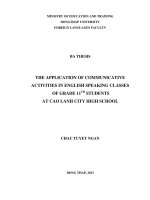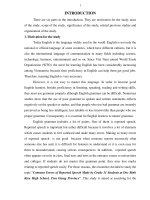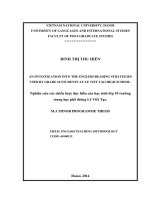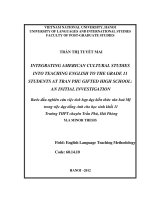Some ativities to help grade 7 students at luong noi junior high school improve their speakinh skill in extra lessons in the afternoon
Bạn đang xem bản rút gọn của tài liệu. Xem và tải ngay bản đầy đủ của tài liệu tại đây (173.05 KB, 17 trang )
Table of Contents
Contents
Pages
1. INTRODUCTION
1.1. The reasons for topic:
1.2. Research purpopes:
1.3. Research objects:
1.4. Research methods:
2. THE CONTENTS:
2.1. Theoretical Base:
2.2. Statement of the problem:
2.3. The solutions:
2.4. Effectives:
3. CONCLUSION AND RECOMMENDATION:
3.1. Conclusion:
3.2. Recommendation:
REFERENCES
2-3
2
2
2
3
3-4
3
3
4
4
15
15
16
17
1. INTRODUCTION
1
1.1. The reasons for topic:
English, an international language, has been a compulsory subject at
secondary schools in Vietnam in the past few years. All students want to learn
English well to have a better future. Along with improving grammar, students
need to improve their language skills: listening, speaking, reading and writing.
For me, the main target of learning a foreign language is to communicate with
people all over the world.
However, there are still students who are not aware of the importance of
the subject in their lives so they are lack of interest in studying this subject. To
build up the students’ passion of learning English, it needs to give them an
exciting learning environment, to innovate teaching methods of teachers to be
scientific and effective. Therefore, the teacher always finds the most suitable
methods to apply to each unit remarkably, helping the students acquire the
language lessons fast with good memory and especially the passion for the
subject. Personally, I always explore and learn through colleagues, through the
media, through many different teaching methods that are interesting and helpful.
Luong Noi secondary school students are interested in learning English,
especially in grade 6, but over time they feel afraid, decreased interest, learn and
lead his people to the quality department increasingly decline in the grade on.
That’s why the higher grade the students are in the more difficult they feel in
learning English and many of them lead to be lazy to learn this subject. The
main reason is that they do not remember structures and new words. From this
reality I have always tried to answer the question “How students can remember
words and sentence structures well to make learning English easier?” And
through many testing lessons I notice that the lesson introducing new language
(often introducing new language focused on new vocabulary, grammar and
language functions through teaching dialogues) is the first and decisive content
of a successful unit. For the above reasons, I boldly launched an initiative
experience "Some activities to help grade 7 students at Luong Noi secondary
school improve their speaking skill in extra lessons in the afternoon."
1.2. Research purpopes:
My purpose in writing this initiative experience was to find out what the
most common and effective methods in developing speaking skill and improve
the quality of teaching English at Luong Noi secondary school, help students
understand the importance of speaking skill in learning English through extra
lessons. Beside that I can cultivate myself the professional capacity in teaching,
improve the teaching methods appropriate for each positive post, each subject
students to improve the quality of teaching and learning English at Luong Noi
secondary school.
1.3. Research objects:
Initiative experience focused on taking some activities to help grade - 7
students at Luong Noi improve their speaking skill in extra lessons in the
afternoon.
1.4. Research methods:
2
- Theoretical Reseach: Reading, Reference, Teacher book, Lesson plan .
- Statement of the problem at Luong Noi junior high school.
- Teaching method.
2. THE CONTENTS:
2.1. Theoretical Base:
Performing the movement of each teacher is a moral example, selflearning and innovation and to meet the requirements of innovative teaching
methods and teaching organizations towards active teaching, learner centered,
scientific lesson design, arranging reasonable activities of teachers and students,
focusing on close object students, promoting positive, proactive creativity in
foreign language learning of the students. Innovating teaching methods so that in
each lesson students are interested in learning, positive practice and remember
new language at class time.
2.2. Statement of the problem:
a. Advantages:
- I am a young teacher so I am always enthusiastic with my English
teaching job and I always want to find something new, interesting for my
students. My love for my lovely students is also a kind of motivation for me to
try my best to help them.
- Many of my students are eager to learn how to speak English well so
that they can communicate with foreigners when they have chance.
- More and more students and their parents are aware of the importance of
speaking skill.
- My collogues as well as other teachers in my school always give me
good encouragement and support.
b. Disadvantages:
- When I applied my experiences and innovations, I also have some
certain difficulties as following:
- Most of my students are ethnic people and they are familiar with
speaking their own language ( The Muong Language ) even at class.
- The number of students who can speak English and wants to improve
their speaking skill is very limited.
- Teaching aids and time are also a big problem as I still need more time
and teaching aids to prepare a contented lesson for extra class in the afternoon.
- Quite a few students are too weak to speak English as they don't know
much lexicology as well as lacking grammar structures.
In the first semester of school year 2015-2016 before applying my
research, I gave a speaking topic to the students in class 7A and 7B “ Talk about
your bedroom.”, testing their speaking skill through lession 3: At home.
Here are the survey results quality speaking skill of students of grade 7 at
Luong Noi secondary school - school year 2015-2016:
3
Good
Moderate
Weak
Poor
No
%
No
%
No
%
No
%
17,
62,
17,
7A
29
0
0
5
18
5
1
3,4
2
2
2
26,
56,
7B
30
0
0
8
17
3
10
2
6,7
7
6
From this result I have adopted some solutions to introduce some
activities to help grade 7 students improve their speaking skill in extra lessons in
the afternoon.
2.3. The solutions:
In fact, very few students can speak English fluently after studying it for 4
years at junior high school. I have observed some of colleagues' teaching lessons
and through observation, I have realized some difficulties that teachers and
students have.
a. To teachers:
- In most of extra lessons in the afternoon, teachers just help their students
do grammar exercises, reading, writing and listening. They ignore speaking skill
so day by day, month by month and year by year, students find it really hard to
speak English though they can understand what other people speak in English in
a simple way.
- Some teachers cannot create speaking activities for students to take part
in or they are not creative in designing activities.
- Some teachers don't make models so that students cannot imitate. Some
teachers don't have enough teaching aids like pictures, real objects..... for
students to express their ideas.
b. To students:
- Many students are not confident to present their ideas in English though
they can understand what other students and their teachers say.
- Many students are not motivated to speak English and are afraid of
making mistakes and being laughed at by their friends or being told off by their
teachers.
- Many students just want to learn new grammar structures because they
are new to them. They don't want to speak what they have learnt. By learning
many grammar structures, they can get good marks in final exam, which only
test students' knowledge of grammar mainly.
With experience of teaching English for more than 12 years, I still find it
rather hard to design speaking activities so that all students can get involved. So,
I have tried many methods and then I can learn what I have done with a class
and then I can improve in other classes.
Class
Total
Excellent
No
%
2.4. Effectives:
To help my students improve their speaking skill, I can't do it in a day or
two. On the contrary, it took me months, even years to draw some following
experiences and innovations.
4
* Pair- work on topics given.
Aim:
To help students ask and answer using questions from brainstorming stage
to create communicative activities.
Time to carry out:
20 minutes.
Preparation:
+ Teacher: Vocabulary of jobs, good questions to explore personal
information.
+ Students: Get to know some information about the person they want to
act.
a. Asking and answering about personal information.
As we know, teachers of English often ask their students to work in pair
asking and answering about their personal because this activity is quite
important and interesting.
Last schoolyear, after students have learnt Units 1,2,3 in English 7, in an
extra lesson in the afternoon, I asked students in class 7A to work in pair asking
and answering about their personal information. I gave them some clues such as:
name, age, job, accommodation, family, telephone number, favorite pastimes. I
also reminded students some phrases to ask their friends back to increase the
communicative target. Such as:
How/ What about you?
And you?
And your....
For weak class, I asked all class to build up the questions before they asked each
other. Questions as following:
What's your name?
How old are you?
Where do you live?
How far is it from your house to school?
How do you go to school?
How many people are there in your family?
What's your telephone number?
What do you do in your free time?
Unluckily, I found my students feel quite bored with this activity because
they did learn how to answer these questions in the morning so during their
working time, I walked around to take notes what their answers were.
First, I asked all students in class to work in pairs simultaneously and then
I required some pairs to present their dialogues in front of the whole class.
Here are some of the dialogues I noted down during that lesson.
* First, I heard two students called Huyen and Ly make their dialogue as
following:
Huyen: What's your name?
Ly: My name is Ly.
Huyen: How old are you?
5
Ly: I'm 11 years old.
Huyen: What do you do?
Ly: I'm a student.
Huyen: Where do you live?
Ly: I live in Ba Thuoc
Huyen: How far is it from your house to school?
Ly: It's about 1 km.
Huyen: How do you go to school?
Ly: I go to school by bike.
Huyen: How many people are there in your family?
Ly: There are four people in my family.
Huyen: What's your telephone number?
Ly: 0373 871 256
Huyen: What do you do in your free time?
Ly: I play badminton.
Obviously, two students named Huyen and Ly made a good dialogue
because they could use all questions needed to ask about personal information.
But they still felt bored with this activity since they have been in the same class
for nearly two years and they have known each other very well. That's why
when listening to Ly's answer, Huyen showed no surprise or not much interest
because she could guess what Ly's answers were.
* Next, I observed 2 students named Thu and Mai
Thu: What's your name, Thu?
Mai: My name is Mai. And your name, Thu?
Thu: My name is Thu. How old are you?
Mai: I'm 11 years old. And you?
Thu: I'm 11. What do you do?
Mai: I'm a student. And you?
THu: I'm a student. Where do you live?
Mai: I live in Ba Thuoc. How about you?
Thu: I live in Ba Thuoc, too. How far is it from your house to school?
Mai: It's about 2 km. How about your house?
Thu: It's about 2 km. How do you go to school?
Mai: I goto school by bike. And you?
Thu: I go to school by bike. How many people are there in your family?
Mai: There are four people in my family. And your family?
Thu: There are five people in my family. What's your telephone number?
Mai: 0373 871 345. And your telephone number?
Thu: 0373 871 254. What do you do in your free time?
Mai: I play soccer. And you?
Thu: I watch TV.
Happily, two students Thu and mai made a better dialogue than Huyen
and Ly's because they did use phrases like: How about you? And you? .....to ask
his friend but they still found this activity a bit uninteresting because they were
6
neighbors and they knew clearly about each other. They knew each other so
clearly that they made a very funny mistake when asking questions:
Thu: What's your name, Mai?
Mai: My name is Mai. And your name, Thu?
From the dialogues students in class 7A made, I thought I had to find a
better way, a more interesting thing but students can still have to practice asking
and answering personal information without feeling bored. So when I taught
class 7B (a weaker class), I also asked the whole class to build up questions as I
did in class 7A. Then I asked students to act if they were new to each other. So
each student have three minutes to note down the name, job,
accommodation.......they liked. They may act if they were famous singers, actors
or actress............. Then I asked students in class 7B to change their seats so that
they could ask the person they wanted to know more. I also reminded students to
use phrases given to ask his/ her new friend to increase communicative target
and encouraged them to be creative in using questions.
And here are two dialogues I noted down:
(Dialogue made by Phan and Loan. Loan is A. Phan is B)
A: Hi. Nice to meet you.
B: Hi. How do you do. What's your name?
A: My name is Messi. And your name?
B: My full name is Ngo Kien Huy. How old are you?
A: I'm 27 years old. How about you?
B: I'm 24. What do you do?
A: I'm a soccer player. And you?
B: I'm a singer. Where do you live?
A: I live in London. And you?
B: I live in Ho Chi Minh city. How do you often go to work?
A: I go to work by bus. How about you?
B: I go to work by car, sometimes by bus. How many people are there in
your family?
A:There are three people in my family. How about your family.
B: There are two people in my family. My mother and I. So what do you
so in your free time?
A: I play basketball. Sometimes I go swimming. And you?
B: I sometimes play video games. Sometimes, I play table tennis.
With the way I used for students in class 7B, I found that all students were
eager to work together to make dialogues. Although they couldn't cover all
personal information needed, their dialogues were more colorful and more
lively. Therefore, to motivate students first to feel like taking part in speaking
activity, then gradually to improve their speaking skill as well as their
confidence, teachers really need to create artificial activities which are new and
interesting to them and above all, teachers have to create activities that are
suitable for students' levels.
7
Pair- work in teaching and learning English is not new and can be called a
daily activity but how teachers make students get involved in this kind of
activity eagerly is a big problem to many teachers.
With the way I used for students in class 7B can be used in many lessons
with other topics relating to exploring personal information.
b. Pair- work about future plan using "will"
Aim:
- To help students express their future intention using "will" after learning
Unit 2.
- To help students exchange information about their plan as well as
revising the use of "will" and develop speaking skill.
Time to carry out:
20 minutes.
Preparation:
+ Teachers: Information/ flashcards about places of interest in their
province or country. Questions to ask about holiday in the future.
+ Students: Revise the use, form of "will" at home first.
Steps:
When I taught class 7B. First, I asked students to speak out some
questions to ask their friends about their plans for a holiday next summer. Here
are questions students in class 7B presented.
Where will you go next summer?
How will you go there?
Who will you go with?
Where will you stay there?
How long will you stay there?
What will you do there?
Will you buy any souvenirs and take any photos?
Then, I asked all students to work in pair simultaneously. I walked around
class to check and help but I found that most of students in class 7B said they
would go to SamSon as they hadn't been to anywhere else and they didn't know
much about other famous places. Therefore, their dialogues were almost the
same. They didn't talk about other places as I expected. When I carried out the
same lesson in class 7A, I asked students to say out the place they wanted to
visit such as Hanoi, Ho Chi Minh city....., then I provided some information
about those places.
you can get there by car/ bus/ train / plane (from Thanh Hoa city)
Hanoi:
you can visit: Sword lake, One Pillar pagoda, Ho Chi Minh's
Mausoleum, Ba Dinh Square,......
you can try: Hanoi Pho, Com cakes, ......
Similarly, I provided some flashcards containing some necessary
information about some places to my students so that they can use.
After students had worked simultaneously, I asked some pairs to present
their dialogues and I was very glad to find that some pairs made very good
dialogues. Here is one of those.
8
I noted down a dialogue between Son and Anh as following:
Son: Hi, NHung. Where will you go this summer?
Anh: I will go to Ho Chi Minh city.
Son: How nice! Who will you go with?
Anh: I will go with my parents and my brother.
Son: How will you go there?
Anh: We will go there by train.
Son: Where will you stay in Ho Chi Minh city?
Anh: We will stay at a small hotel.
Son: How long will you stay there?
Anh: We will stay there for a week.
Son: What will you do in Ho Chi Minh city?
Anh: We will visit Nha Rong Harbor, Dam Sen Water Park, Tien Spring
park and go to a music live show. And we'll try a lot of specialties in Ho Chi
Minh city.
Son: Will you buy any souvenirs and take any photos?
Anh: Of course, we will. I will have a gift for you and I will show you my
photos.
Son: Great. Have a good trip.
Anh. Thanks. How about you?
Son: This summer, I will go to Hanoi with my parents. We'll go there by
bus. We'll stay at my uncle's house for 4 days. I think we will visit you can visit:
Sword lake, One Pillar pagoda, Ho Chi Minh's Mausoleum, Ba Dinh
Square,......And we'll try Hanoi Pho, Com cakes, ......We'll take some photos and
buy some gifts. I'll give you a nice gift.
Anh: Thanks. Enjoy your journey.
Once again, if teachers want their students to be interested in speaking
activities, they have to create new, interesting and suitable ones. Moreover, to be
successful in one activity, teachers must have good knowledge in that filed and
prepare what is essential to help students in case they get stuck in exploring
information.
* Application:
All teachers of English have known the importance of pair work in
learning English so they can use this type of activity whenever they want to help
their students to speak.
* Report.
Report is also an excellent way for students to improve their speaking
skill as well was their confidence because if one wants to report something, he
will have to stand up in front of class to do it.
In order to have a good report activity, teachers need to set tasks to
students before asking them to report something. Report activity is often used
after pair work. Teachers also need to provide cards so that students can take
notes.
After students in class 7B finished their open pairs (asking and answering
about personal information), I asked some students to come to black board to
9
talk about themselves and about a friend he has talked with. Unfortunately,
many students can't remember information about their friends, some even forget
information about themselves. Furthermore, all students in class 7B have known
each other very well so they were not interested to hear about their friends.
When I carried out pair- work activity about personal information in class
7B, I had some more experience so before I asked students to adapt their role, I
drew a table as below and asked them to fill in during their discussion. Students
first fill in information in column (me) then ask a friend to fill in column (My
new friend) but not to write anything in column (My online friend)
Name
(me) Huy
(My new friend)
Messi
(My online
friend)
.......................
Age
Job
Accommodation
27
24
singer
soccer player
Ho Chi Minh London
city
Family
two people
three people
Means of transport car/ bus
bus
In free time
play
video play basketball, go
games, play swimming.
table tennis
Once students have had their new information about them and about their
new friends, their report is much better.
Here is a report presented by a student named Sang in class 7B.
Hello everyone. Nice to meet you today. My name is Huy. I'm 27 years old and
I'm a singer. I live in Ho Chi Minh city with my mother. I work in a studio and I
often go to work by car. Sometimes, I go by bus. In my free time, I play video
games, play table tennis.
Messi is my new friend. He is 24 years old and he a soccer player. He lives in
London with his parents. He goes to work by bus. In his free time, he plays
basketball, goes swimming.
With this report, we can see, it is short but quite informative about a
person and I think it's good if a grade -7 students can report like this.
During, Sang and other's reports, I told other students (listeners) to listen
to their friends carefully and fill in column (My online friend) about a person
they like. By doing this, I found that all students listened to their friends' report
attentively, partly because their friends now are different (famous people) and
partly I would call some students at random to report about themselves and
about a person they have just taken notes about. And happily, class was
surprisingly quiet, we could hear only the presenter's voice, no Vietnamese was
used during the report.
I used this way of report when teaching class 7A and 7B to talk about
their future plans using "will". I found all students were eager to listen to their
friends' report and concentrate on their lesson much better than ever before.
10
* Picture description.
Picture description is a very good activity for students to improve their
speaking skill in extra lessons because in extra lessons, students have more time
to speak and they can speak about their own pictures, not only pictures given by
their teachers.
* Describing houses.
Aim:
To help students revise vocabulary and structures of describing a house
and talk about their house or a house they know. (There is / There are..)
Time to carry out:
20 minutes.
Preparation:
Vocabulary on houses and main things in a house, pictures of houses,
three small presents.
After learning Unit 3 (At home- English 7), In an extra lesson, I asked
students in class 7A to describe their house but they did not come up to my
expectation because most of the house they describe were so similar. They just
described their own house so there was nothing special as most of their houses
were small ones in the countryside.
Realizing that better descriptions should be made, Therefore, before I
taught students in class 7B, I asked a teacher of Fine Art who also teaches class
7B to help me. That is, in her Fine Art lesson, she asked each student to draw a
house they dream to have in the future. Luckily, pictures of houses they drew
were so amazing. I asked the teacher of Fine Art to lend me those pictures and
when I taught class 7B the topic "Describing a house", I delivered their pictures
to them and told them to present their description. With the help from own
pictures, students were eager to show off their pictures and fluently talked about
their houses in dream. After students have finished their talk, I asked students to
choose the most beautiful house and a present was given to the owner of that
house and a gift for the best description was given and a gift for the best
presenter. No one can guess how happy the students in class were!
* Retelling story .
Aim:
To help students develop their speaking skill and talk about past events
using past simple tense.
Time to carry out:
20 minutes
Preparation:
Pictures of past events, vocabulary of holiday, table of irregular verbs if
necessary.
Story completion a quite difficult activity for grade 7 but if the teachers
can prepare enough picture cues, they can do surprisingly well.
Basing on pictures about the Robinsons in Unit 9 - English 7, before I
taught class 7B, I asked students and I myself prepared some similar pictures so
that students could use to retell their story of a holiday they enjoyed.
11
* Discussion:
Aim:
To help students have a discussion on a quite difficult topic. Students can
have a chance to develop their speaking skill and express their personal points of
view.
Time to carry out:
15 minutes
Preparation:
+ Teacher: prepare some advantages/ disadvantages of living the city and
in the country.
+ Students: prepare some advantages/ disadvantages of living in the city/
country.
Three years ago, when I taught class 7A (schoolyear 2013-2014), after
they had learnt part B- Unit 15. I asked them to discuss where they liked to live.
I used two questions: Do you like the city? Why/ Why not? Do you like the
countryside? Why / Why not?
First, I asked them to take note reasons why they liked the country or the
city on their own. Then I asked them to use the questions above to ask their
friends. But unfortunately, students could present very few reasons. So when I
taught class 7B, I changed the way before discussion.
Before their discussion, I asked all students to present some reasons why
they liked the city and the country. All students were interested in giving their
ideas. Then I asked students to discuss and present their ideas. Although some
students just picked up some ideas, the reasons they used were sensible.
* Interview.
Interview is an interesting activity for students to develop their speaking
skill in front of other people.
Aim:
To help students know how to use some questions to interview other
people
(famous people)
Time to carry out:
20 minutes
Preparation:
+ Teacher: Pictures / information about some famous people such as
scientists, inventors, singers....
+ Students: Pictures and information about their idol.
When I first used this activity in class 7A after students had learnt part BFamous People (Unit 16) three years ago, I let students interview their friends
who acted as famous people but I found that the questions students used were
not sensible and they made some funny mistake like: Where were you born?
Who born you?/ When did you die? or some questions relating too detailed
personal information such as: How many children do you have?/ How much
money do you have? Then I asked some pairs to interview their idol in front of
12
class, they did not know how to introduce them and start or end their
conversation naturally.
When I taught class 7B, before students carried out their interview, I
asked the whole class to brainstorm some good questions to interview some
famous people. Then I wrote down the questions on the board for students to put
them in good order for an interview.
Some questions about Thomas Edison as following:
When and where were you born?
What school did you go to?
Where did you establish the first central power station?
How many things did you invent?
What is your most important invention?
Are you going to invent something else?
I also asked students to prepare questions to interview General Giap,
Uncle Ho and Andersen.......
Before students came to the board to present their interview, I gave them a
poster with some model sentence to start and end their interview.
Reporter: Hello everyone. Welcome to our program FAMOUS PEOPLE
today. Today, we'll meet a very famous person and welcome Mr. .....................
Thank you for coming. Take a seat please.
Mr. ........: Thank you. I'm very happy to be here, too.
Reporter: First, I would like to ask you some questions. I hope you don't
mind.
Mr. .........: Of course I don't mind. Please go ahead.
Reporter: ......................................................................................................
(At the end of the interview)
Reporter: Thank you very much Mr. ............... We wish you good health
and more success in your life.
Mr. ........ Thank you.
With this activity, I found all students were enthusiastic to present their
interview though some mistakes in pronunciations were unavoidable. What
students acquired was the way they presented their interview naturally and
eagerly.
* Table completion.
Aim:
To help students ask and answer questions using adverbs of manner and
then use information to report about their ability using "neither........nor;
both...........and............."
Time to carry out:
15 minutes
Preparation:
+ Teacher: A sub-board to make model.
+ Students: Revise adverbs of manner.
When I asked students in class 7B to work in pair to ask and answer how
their friends do something by using adverbs of manner they had learnt before. I
13
asked my students to retell some common adverbs of manner such as carefully,
carelessly, well, badly, skillfully, slowly, quickly, ......
Here are some of the dialogues made by my students.
Nam: How do you cook?
Ha: I cook slowly. And you?
Nam: I cook badly. How do you play soccer?
Ha: I play soccer carefully. And you?
Nam: I play soccer badly.
Obviously, Nam and Ha made some mistakes in using adverbs of manner.
From the mistakes students in class 7A made, when I taught class 7B, I tried a
new way and found it much better.
First, I asked students in class 7 B to do a matching exercise as following:
A
B
cook
skillfully
play soccer,.................
well/ badly
swim
carefully/ carelessly
ride a bike
safely
run
fluently
speak English
fast / quickly
.....................
Then, I asked my students to draw a table like this:
me
my friend
(...................)
cook
play soccer
swim
speak English
I told my students to use the following mapped- dialogue to ask their
friends and fill in the table.
A: How can you cook?
B: I cook well. And you?
A: I cook badly.
...........................................................
After students finish their dialogues they will have a table like the
following.
me (Minh)
my friend ( Hoang.)
cook
badly
well
play soccer
skillfully
skillfully
swim
slowly
slowly
speak English
fluently
fluently
Once students have their table completed, I asked them to use the
following model to report.
14
Hoang is my friend. Hoang cooks well but I cook badly. Both Hoang and I
play soccer skillfully. Neither Hoang nor I swim quickly. Both Hoang and I
speak English fluently.
Basing on the model, many of my students asked and answer questions
using adverbs of manner more fluently. Then they could make good report using
some advanced grammar points such as: Both......and........, neither .........nor........
After a school year of applying “Some activities to help grade 7
students at Luong Noi secondary school improve their speaking skill in
extra lessons in the afternoon.”, in the first semester of school year 2016-2017
with the same topic, I have found that students have progress in improving their
speaking skill in extra lessons in the afternoon. This can be achieved through
their performance in the class as well as in the test.
Here are the results quality speaking skill of students of grade 7 at Luong Noi
secondary school - school year 2016-2017:
Excellent
Good
Moderate
Weak
Poor
Class Total
No
%
No
%
No
%
No
%
No
%
27
2
7,4
9
33, 14 51,
2
7,4
0
0.0
7A
3
9
39,
7B
28
2
7,1 14 50
11
1
3,5
0
0.0
4
Compared with the results of the first semester of school year 2015-2016,
we can see the percentage of students scoring excellent, good, average rate
increases still weak and least, fell less sharply.
When I applied this innovative experience in teaching speaking skill for
my grade 7 students, I saw them working more attentively and effectively. That
is why they have been more interested in this skill. This makes me pleased so
much to have more ideas to do my teaching better and better.
3. CONCLUSION AND RECOMMENDATION:
3.1. Conclusion:
With some experience and innovation I have used over the years, I find
that if teachers want to help their students develop their speaking skill, they need
to prepare the lessons carefully and be creative in using speaking activities for
students. Teachers should:
- Provide maximum opportunity to students to speak the target language
by providing a rich environment that contains collaborative work, authentic
materials and tasks, and shared knowledge.
- Try to involve each student in every speaking activity; for this aim,
practice different ways of student participation.
- Reduce teacher speaking time in class while increasing student speaking
time. Step back and observe students.
- Do not correct students' pronunciation mistakes very often while they
are speaking. Correction should not distract student from his or her speech.
15
- Provide the vocabulary beforehand that students need in speaking
activities. I think that all teachers can use the ways I use for my students as long
as they simplify speaking tasks so that they are suitable for their students' levels.
I am looking forward to receiving sincere comments from all collogues and
anyone who is interested in reading my writing.
3.2. Recommendation:
Due to limited time, knowledge and other conditions, I have only
mentioned techniques to introduce new language effectively. Unavoidably, my
research may have some certain short – comings which I hope to solve when
coming back to this matter on other occasion.
I also hope that the school principal board will pay more attention to the
equipments for teaching and learning English.
Let the teachers have the opportunities to learn and exchange lessons
learned through the seminars.
Thank you very much for reading!
Luong Noi, May 25th, 2017
Principal Confirm
I assure that this is my innovative
experience. I do not copy other people's content.
Written by
Nguyen Truong Viet
16
REFERENCES
- English Language Teaching Methodology.
- Methods of Teaching English. (By: M. E. S. Elizebeth)
- Teaching English as a foreign language.
- A Methodology Course for English language Teachers.
- Text book English 7.
17









